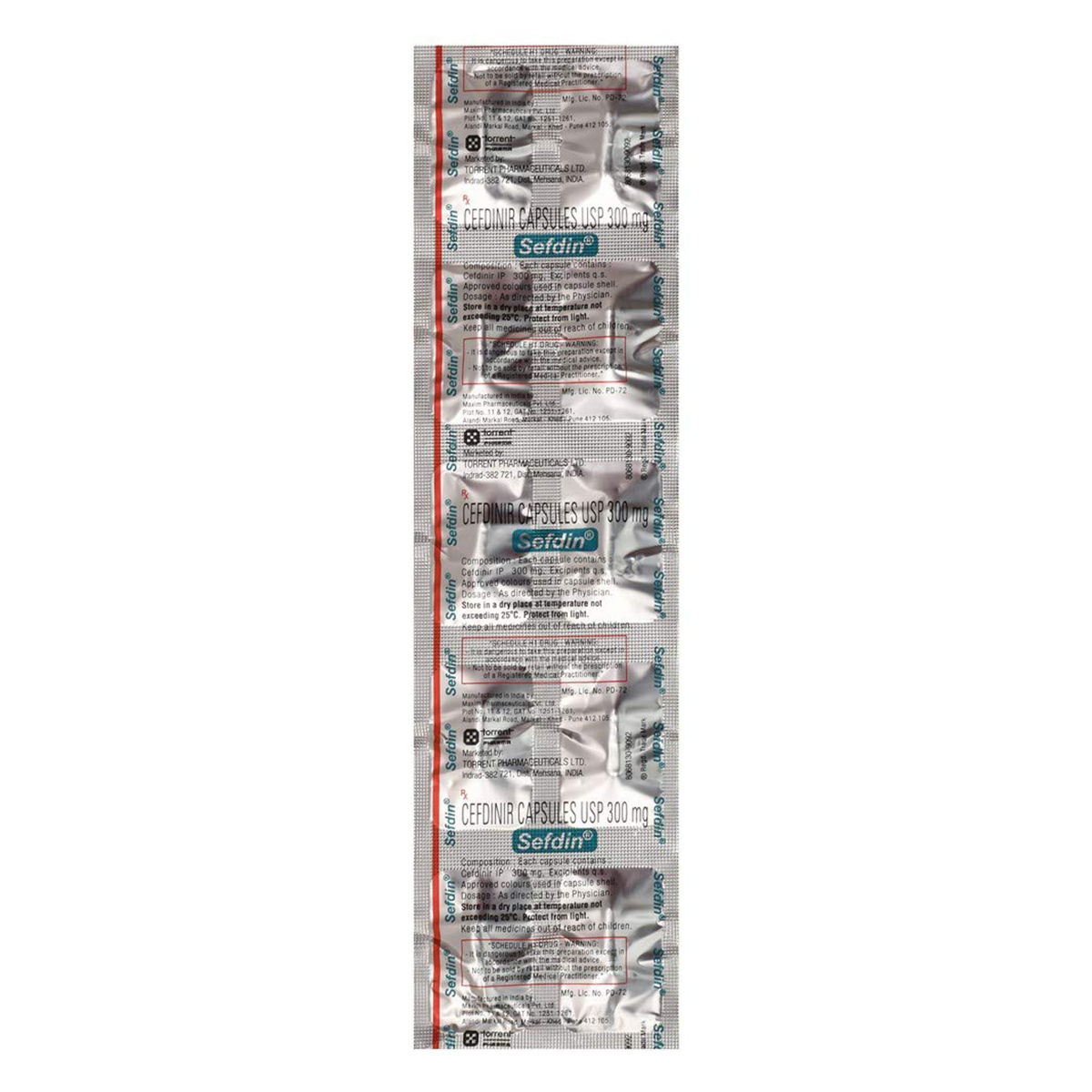Cefrine 300 mg Capsule 10's
Cefrine 300 mg Capsule is used to treat bacterial infections. It contains Cefdinir, which works by interfering with the formation of the bacterial cell wall and killing the bacteria. In some cases, this medicine may cause side effects such as diarrhoea, nausea, stomach pain, vomiting, rash, and headache. Before taking this medicine, inform the doctor if you are pregnant or breastfeeding, taking any other medication, or have any pre-existing medical conditions.
₹330.3*
MRP ₹367
10% off
₹311.95*
MRP ₹367
15% CB
₹55.05 cashback(15%)
Free Delivery
With Circle membership
(Inclusive of all Taxes)
This offer price is valid on orders above ₹800. Apply coupon PHARMA10/PHARMA18 (excluding restricted items)
Know Your Delivery Time
Provide Delivery Location



Selected Pack Size:10
4 ₹131.9
(₹32.98 per unit)
In Stock
10 ₹330.3
(₹33.03 per unit)
In Stock
Whats That

Secure Payment

India's Most Trusted Pharmacy

Genuine Products
Composition :
Manufacturer/Marketer :
Consume Type :
Return Policy :
Expires on or after :
About Cefrine 300 mg Capsule
Cefrine 300 mg Capsule belongs to a class of medication called 'antibiotics' used to treat several bacterial infections of the urinary tract, bones and joints, heart, lungs, brain, chest, ears, skin or soft tissues. Bacterial infection is when harmful bacteria grow in the body and cause infection. It can infect any part of the body and multiply very quickly. Cefrine 300 mg Capsule does not work against infections caused by a virus such as flu or a common cold.
Cefrine 300 mg Capsule contains Cefdinir, a cephalosporin antibiotic that works by interfering with the formation of the bacterial cell wall (a protective covering) necessary for their survival. This damages the bacterial cell wall and kills bacteria.
Take Cefrine 300 mg Capsule as prescribed by your doctor. You are advised to take Cefrine 300 mg Capsule for as long as your doctor has prescribed it for you based on your medical condition. In some cases, you may experience diarrhoea, nausea, stomach pain, vomiting, rash, headache or vaginal itching or discharge. Most of these side effects of Cefrine 300 mg Capsule do not require medical attention and gradually resolve over time. However, if the side effects persist or worsen, please consult your doctor.
Please tell your doctor if you are allergic to Cefrine 300 mg Capsule , cephalosporin antibiotics or any other medicines, please tell your doctor. If you are pregnant or breastfeeding, inform your doctor before taking Cefrine 300 mg Capsule . Cefrine 300 mg Capsule is not recommended for babies below six months of age as the safety and effectiveness were not established. Drive only if alert, as the Cefrine 300 mg Capsule may cause dizziness. You are advised to maintain a time gap of a minimum of 2 hours between taking Cefrine 300 mg Capsule and antacids containing aluminium, magnesium, iron supplements and multivitamins containing iron. These may reduce the body's absorption of Cefrine 300 mg Capsule by the body.
Uses of Cefrine 300 mg Capsule
Medicinal Benefits
Cefrine 300 mg Capsule contains Cefdinir, a cephalosporin antibiotic used to treat several bacterial infections. Cefdinir is a broad-spectrum antibiotic that acts against aerobic (grow in the presence of oxygen) and anaerobic (grow in the absence of oxygen) gram-negative and gram-positive bacteria. It interferes with the formation of the bacterial cell wall (a protective covering) that is necessary for their survival. Thereby damaging the bacterial cell wall and killing bacteria.
Side Effects of Cefrine 300 mg Capsule
- Diarrhoea
- Nausea
- Stomach pain
- Vomiting
- Rash
- Headache
- Vaginal itching or discharge
Directions for Use
Storage
Drug Warnings
Please tell your doctor if you are allergic to Cefrine 300 mg Capsule , cephalosporin antibiotics, or other medicines. If you have kidney problems or inflammation of the large intestine, inform your doctor before taking Cefrine 300 mg Capsule . If you are pregnant or breastfeeding, consult a doctor before taking Cefrine 300 mg Capsule . Cefrine 300 mg Capsule is not recommended for babies below six months of age as the safety and effectiveness were not established. Drive only if alert, as the Cefrine 300 mg Capsule may cause dizziness. You are recommended to complete the entire course of Cefrine 300 mg Capsule as your doctor prescribes for effective results. Cefrine 300 mg Capsule may interact with specific tests such as glucose (sugar) in urine and Coomb's test, giving false-positive results. Therefore, inform your doctor that you are taking Cefrine 300 mg Capsule before undergoing any tests. You are advised to maintain a time gap of a minimum of 2 hours between taking Cefrine 300 mg Capsule and antacids containing aluminium, magnesium, iron supplements and multivitamins containing iron. These may reduce the body's absorption of Cefrine 300 mg Capsule by the body.
Therapeutic Class
Drug-Drug Interactions
Drug-Food Interactions
Diet & Lifestyle Advise
- Take probiotics after completing the entire course of Cefrine 300 mg Capsule to restore some healthy bacteria in the intestines that may have been killed. Taking probiotics after antibiotic treatment can reduce the risk of antibiotic-associated diarrhoea.
- Certain fermented foods like cheese, yoghurt, kombucha, sauerkraut, and kimchi can help to restore the good bacteria of the intestine.
- Include fibre-rich foods, which can be easily digested by your gut bacteria and help stimulate their growth. Thus, fibre-rich foods may help restore healthy gut bacteria after a course of antibiotics. Whole grains such as brown rice and whole-grain bread should be included in your diet.
- Make sure you drink plenty of water or other fluids every day while you are taking Cefrine 300 mg Capsule .
- Avoid alcohol consumption as it may increase adverse effects.
Habit Forming
How Cefrine 300 mg Capsule Works
What if I have taken an overdose of Cefrine 300 mg Capsule
Alcohol
Caution
The interaction of Cefrine 300 mg Capsule with alcohol is unknown. Please consult a doctor before consuming alcohol while using Cefrine 300 mg Capsule .
Pregnancy
Caution
Cefrine 300 mg Capsule is a category B pregnancy drug and is given to pregnant women only if the doctor thinks the benefits outweigh the risks. Please consult a doctor if you are pregnant or planning for pregnancy.
Breast Feeding
Caution
It is unknown whether Cefrine 300 mg Capsule is excreted in human milk. Cefrine 300 mg Capsule is given to breastfeeding mothers if the doctor thinks the benefits outweigh the risks. Please consult a doctor if you are breastfeeding.
Driving
Caution
Cefrine 300 mg Capsule may cause dizziness in some people. Therefore, avoid driving if you feel dizzy after taking Cefrine 300 mg Capsule .
Liver
Safe if prescribed
If you have any concerns regarding the use of Cefrine 300 mg Capsule in patients with liver problems, please consult a doctor.
Kidney
Caution
Take Cefrine 300 mg Capsule with caution, especially if you have a history of Kidney diseases or conditions. Your doctor may adjust the dose as needed.
Children
Caution
Cefrine 300 mg Capsule is not recommended for babies under 6 months of age as the safety and effectiveness have not been established.
Country of origin
Manufacturer/Marketer address
Author Details
We provide you with authentic, trustworthy and relevant information
FAQs
Disclaimer
Customers Also Bought
Product Substitutes














